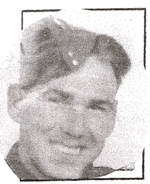Wall of Service
Column
5
Row
11
Williams, Mitchell Sherman "Will" "Bill" F39938 Sergeant, West Nova Scotia Regiment, Royal Canadian Army.
Born on September 16, 1921 in Lockeport, Shelburne County; died August 8, 2002 in QEII Health Sciences Centre. Son of William Langille and Ethel (Enslow) Williams; Married to Dorothy "Doris" Chaplin from England on May 28, 1943 in Lewisham, England, whom he met while overseas. They had four sons: David, Brian, Robert, and William, as well as four daughters: Deborah, Beverly, Patricia, and Audrey. Bill enlisted in Bridgewater, in September 1939, went overseas with the regiment in December of 1939 and arrived in England in January of 1940. Bill fought in Sicily and Italy where he was wounded in November 1943 and required a hospital stay in Berry, Italy. He was promoted from private to lance corporal and then again to sergeant by Commander Bullgart-Hebb, his commanding officer. Bill arrived in Halifax on the Nieux Amsterdam and was discharged at Camp Hill, Halifax August 4, 1944. Following his service, Bill worked as a commissionaire at the Department of Defence and then on Fort Francis Oceanographic Survey Boat. Later he worked as a stationary engineer at Shearwater and Bedford Oceanographic. Finally Bill was transferred to CFB Baccaro and retired in the early 1970s. He was a member of the Philadelphia Lodge 47 of the Free Masons. Daughter Audrey recalls that her father was proud of what Canada did during the war and often spoke of his time overseas. He was buried in Port Clyde Cemetery.
"I joined the army in 1939. Coming from a small village in Shelburne my experience of life was very limited. My regiment left for England from Halifax in 1939. We did some training in Keston, Bromley, England and this is where I met my wife to be, Dorothy Chaplin. We were shipped out to Scotland on manoeuvres. While I was there my sergeant came to me while I was on the ground in a practice, he kicked my foot and said ‘Williams, you're going to be married.' So off I went back to Bromley to be married on May 28th, 1943. While in England before being shipped out we did a lot of training in the South of England. In July of 1943 we were shipped out to the Island of Sicily where I caught malaria. I couldn't leave with my regiment who were going to Italy. After recuperating from the malaria I joined my regiment in Italy. I was wounded in a place called Berry. I had wounds in my right ankle, right hand and buttocks form shell fragments. In the field dressing hospital I was covered up and put among the dead. Someone noticed my blanket moving. Soon after I was operated on. When I was able, I left by ambulance for the boot of Italy then flown to Sicily and South Africa. I returned to England on the Lady Nelson. I was sent to a hospital in Birmingham from December to early spring, then off to Surrey to convalesce for two months. I had just arrived in London when I relapsed with malaria on the platform of the railway station. I wound up in a hospital in London for about a week. On two week's leave I went to my in-laws in Bromley where I was cared for. Then back to hospital in London for about a week. I had a month's leave and then went on to Camp Hill Hospital, Halifax for treatment of my wounds. My wife followed in the fall of 1944."
